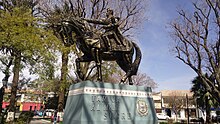Antonio José de Sucre
Antonio José de Sucre y Alcalá (born February 3, 1795 in Cumaná , New Granada ; today Venezuela ; † June 4, 1830 , murdered in the Berruecos forest near Pasto , Greater Colombia ; today Colombia ) was a South American freedom fighter and was a successful general under Simón Bolívar .
Life


Antonio José was the son of Don Vincente Sucre y Urbaneja and Doña Maria Manuela de Alcalá. His mother died when he was seven years old. At thirteen he began in Caracas a military training, rose up quickly and took part in an early stage of the South American independence movement under Francisco de Miranda . Sucre, promoted to lieutenant colonel in 1813 , became adjutant to General Santiago Mariño . He commanded several battles and defeated the Spanish troops under their commander Antoñanzas in August 1813.
Antonio José Sucre later became Simón Bolívar's closest confidante and led several important battles in the South American Wars of Independence . In 1822 he was sent from Bolívar to the Quito region , now Ecuador ; there he defeated the Spanish troops in the battle of the Pichincha . Together with Bolívar, Sucre fought in the viceroyalty of Peru from 1823 to 1825 . In 1824 he won the Battle of Junín against Spanish troops . His most important battle is likely to have been that at Ayacucho on December 9, 1824, which Sucre fought in the absence of Bolívar and which brought the independence efforts of the former viceroyalty of New Granada and Peru to an end. For this, Sucre got the title Gran Mariscal de Ayacucho from Bolívar .
In 1826 Sucre was elected president of the newly founded nation of Bolivia . He formed a government led by Simón Bolívar, who drafted a new constitution. In 1828, Sucre was forced to resign due to strong resistance from the Bolivian people to his policies.
In 1830 he was elected President of the Congress that met in Bogotá with the aim of securing the unity of Greater Colombia. But the congress failed and on the way to Quito Sucre was murdered on June 4, 1830, presumably by political opponents. Sucres assassination was probably related to the succession of Bolívar; because he was his designated successor.
The nominal capital of Bolivia , a federal state of Venezuela , an administrative unit of Colombia , a district (Mariscal Sucre) , the airport and the western bypass of Quito and the former currency of Ecuador were named after him. In addition, numerous museums, streets and squares all over Latin America bear his name.
Web links
- Literature by and about Antonio José de Sucre in the catalog of the Ibero-American Institute of Prussian Cultural Heritage, Berlin
| predecessor | Office | successor |
|---|---|---|
| Simón Bolívar |
President of Bolivia December 29, 1825-18. April 1828 |
José María Pérez de Urdininea |
| personal data | |
|---|---|
| SURNAME | Sucre, Antonio José de |
| ALTERNATIVE NAMES | Sucre y Alcalá, Antonio José de (full name) |
| BRIEF DESCRIPTION | South American freedom hero |
| DATE OF BIRTH | February 3, 1795 |
| PLACE OF BIRTH | Cumaná , New Granada |
| DATE OF DEATH | June 4, 1830 |
| Place of death | Berrucos forest near Pasto , Greater Colombia |

